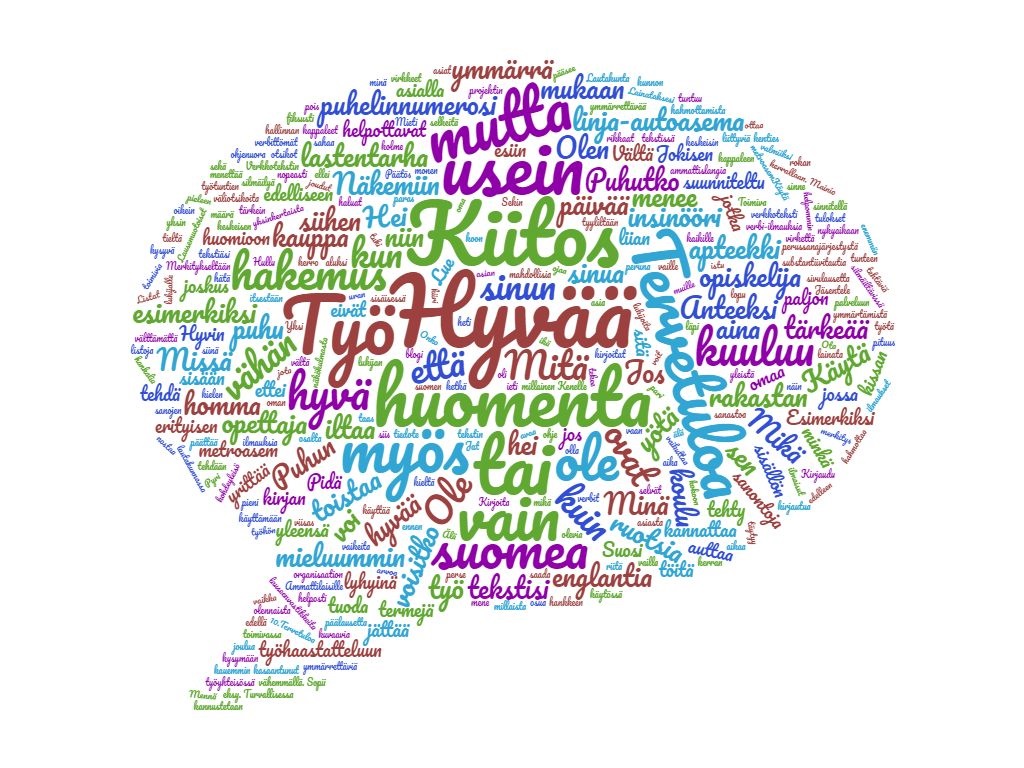“Puhutaanko suomea – or shall we use English?” International communication at work in Finland
In the HIWE project, we continue digging into the stories told by highly skilled internationals. While doing that, we have realised that many of the themes discussed in the interviews are prevalent inside our own research team.
Learning and speaking the Finnish language is among the core issues that bother international professionals. It is no news that complicated grammar and a significant gap between spoken and written language make Finnish one of the most difficult in the world.
However, as we see it, imperfect language should not be a barrier to understanding each other. It is more important that both parties want the communication to work out.
Diverse experiences, different intentions
The experiences, attitudes and intentions of internationals related to working and living in Finland differ a lot. Some internationals come to Finland for a couple of years with temporary contracts. Others plan to stay for good and obtain citizenship.
Therefore, the needs to learn the Finnish language are not the same. What if you came for a two-year temporary contract and you have no guarantees of extension, or you know that as an employee of an international corporation, you are likely to be transferred to another country?
Knowing some expressions, such as “Huomenta” in the morning when entering the office, “En tarvitse kuittia” in a grocery shop, “Hyvää viikonloppua” on Friday, helps in everyday life, but does one need to go much deeper?

Also, encounters with the Finnish language vary. For example, those internationals in the interviews who have a Finnish-speaking spouse found it easier to start speaking Finnish and using it in work and everyday life.
Also, some interviewees mentioned that their non-Finnish spouses who participated in the integration programs spoke Finnish better than employed internationals themselves because they just did not have time or a social circle to communicate in Finnish.
What makes the issue relevant is that some internationals saw learning the Finnish language as the main obstacle on their way to fully integrating into Finnish society. They also were determined to learn it.
Others admitted that after many years of living in Finland, they gave up on trying and chose to study Swedish in order to pass the YKI-examen (Yki testi), the language test which is required for getting Finnish citizenship. Otherwise, they used English in their work and everyday lives.
English is to blame?
The opportunity to use English in work-related communication in Finland is something that attracts internationals and makes international recruitment of highly skilled professionals possible.
At the same time, English is also one of the reasons why internationals get stuck with the Finnish language. Does Finnish-speaking colleagues’ willingness to use English as a working language actually work against the aspirations of an international colleague to learn the local language?
In many professions, language skill is one of the components that constitute the expertise of an employee. The attempts to communicate knowledge in a language which one has just started to learn may threaten or diminish their perceived level of expertise.
Insecure and disturbing feelings arise especially during the recruitment process, but also when one just starts working in a company – at moments when internationals feel that they need to demonstrate their capabilities and professionalism.
Internationals choose to speak English in order to keep up with the level of communication required of them. In a non-English speaking country, then, communication in English language makes internationals equal to locals in the workplace.
When and how to switch to Finnish?
However, the longer one chooses to speak English with their colleagues, the more difficult it becomes to switch to Finnish. Many internationals admit that the lack of Finnish language skills restricts their opportunities to get closer with Finnish colleagues and evokes the feeling of being excluded from both decision-making processes as well as informal communication.
Speaking one’s own mother tongue is a skill which feels so natural to have. We usually feel confident about it because it is something we are genuinely good at.
However, when we need to use alternative languages, it might feel disturbing and challenging for self-confidence. Not many of us reach the level of native speakers, but in order to make communication possible one needs to agree to expose oneself as an imperfect speaker of a foreign language. It concerns both internationals who are living in Finland, but also Finns who hesitate to speak their imperfect English.
At the end of the day, language is just a tool which makes communication possible. That’s probably why kids learn any language so easily, regardless of where they come from – Sweden, Ghana, China or Lithuania. They are not concerned with complicated Finnish grammar. They are just keen on playing with each other.
Our own experiences – English or Finnish?
The HIWE project focuses on the experiences of highly skilled internationals, and it unites international stakeholders in the business and public sector with the research community. The working language of the project is English.
We the authors work as researchers in the project. In the next, we would like to share our own experiences and thoughts on the role of the Finnish and English language in work communication from the perspective of an international (Anna) and a native speaker (Satu).
Anna: It’s not easy, but I am not going to give up on learning Finnish
“I am myself a foreigner in Finland; so, most of the stories related to the Finnish language which we heard in the interviews resonated with me. I have been studying Finnish for many years, but I still struggle to use it on an everyday basis. Speaking, in particular, is difficult for me.
In my work environment, everyone can speak English fluently. Oftentimes, I am the only non-Finnish person in the room, but people still speak English. It feels comforting, but also a bit shameful – why do I make all those people speak English in Finland?
At some point, my colleagues asked me what language I preferred in the meeting, and I had to admit that I preferred English, no matter how desperately I wanted to start speaking Finnish.
The hidden truth is that we have never had enough time to afford to communicate in Finnish at my level. Sometimes, there are situations when people start talking in Finnish at the meeting. And for a moment, it might feel as if lost my voice even when I can understand what they are talking about.
English helped me a lot in getting close to Finnish people and understanding them. However, I believe that speaking Finnish will allow me to get to the next level.
Therefore, I do not give up. I continue learning Finnish and try to speak Finnish when I meet new people who do not know that I speak English.”
Satu: Local speakers have the power – but it is not an obstacle to making friends
“I think that the topic of the Finnish language is important. It needs to be discussed, even if it makes us, and me personally, feel a bit uncomfortable.
I wish to be welcoming. I wish to make it easier for an international colleague who does not speak Finnish to get into the work community. I can speak English, so for me, the easiest way to do that is to switch the language to English. However, my English is not as good as I would hope. I also try to encourage Anna to talk in Finnish at least during coffee breaks.
When a Finnish speaker switches the language to English several things happen. We, who speak the local language, have the power. We implicitly define the situations, where interaction with our non-Finnish speaking colleagues is relevant.
I sometimes feel uncomfortable using English because when I use my broken English, it also downgrades my own expertise since I cannot express all the things in a foreign language as accurately as I wish. Especially when I am tired.
Still, I would say that having the possibility to use English – both professionally and in casual situations – has been really beneficial for my English skills and a good exercise for my middle-aged brain. Not to mention, what good a friend and colleague I have got in Anna!”
Anna Elkina (University of Turku) & Satu Aaltonen (University of Turku)
Both authors work as researchers in the HIWE project.
